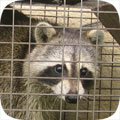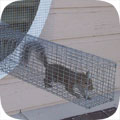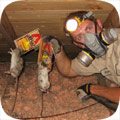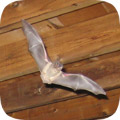- greenwood@wildlifeanimalcontrol.com
Call 24/7 for a free quote:
662-540-1085
Greenwood Wildlife Animal Control
Professional Wildlife Removal Company Servicing Greenwood, MS
If you have a problem with wildlife in your Greenwood home, your best option is to hire a company that specializes in Mississippi wildlife removal only. This is a specialty business, and regular pest control companies do not use the proper techniques to solve animal problems. I have spent many years reviewing Mississippi and Greenwood, and I recommend the following:
Wildlife Removal Mississippi
Cell Phone: 662-540-1085
NOTE: If you have a dog or cat problem, call Leflore County Animal Services: (662) 453-3311

Wildlife Removal Mississippi specializes primarily in removing animals from attics of homes and buildings - this includes squirrels in attics, raccoons, and rats or mice in homes. Mississippi also has a documented problem with
bats in buildings, and Wildlife Removal Mississippi is specially trained in bat removal. They also perform general wildlife trapping services, such as the capture and removal of skunks or opossums on the
property. Call 662-540-1085 to discuss your critter problem and schedule a same-day or next-day appointment. Click here to learn more about what prices we charge in 2020.
When hiring a company to solve your wild animal problem, you want these features:
- Specializes in wildlife removal, not pest control
- Fully Mississippi and Leflore County licensed and insured
- Works 7 days per week (critters don't take weekends off)
- Performs full building inspections: enters and inspects attic
- Performs exclusion repairs, with guarantee against animal re-entry
- Offers cleanup of biohazardous wildlife waste
Wildlife Removal Mississippi is a full-service Greenwood wildlife removal company. This is very different from a regular Greenwood pest control company. The pest control companies spray poison to kill insects. This is not at all
similar to wildlife removal. Wildlife Removal Mississippi performs a full inspection of the home or property, and determines why the animal(s) are there, and if inside a building, how the animals got inside. All
animals (including rodents) are trapped and removed, or if possible, removed from the building using special exclusion devices. Once the animals are gone, preventative repairs are essential, and
cleanup is sometimes recommended.
 Greenwood wildlife trapping - it's not as simple as it may seem. It's illegal in Mississippi to trap without a license. Trap type is very important and there are many different types, bait is somewhat relevant, trap placement
is vital, and there are dozens of small things that are very important to know.
Safety is a concern. Then once the animal is trapped, it must be removed and dealt with in the proper manner according to Mississippi law. We offer Greenwood raccoon removal. Read more about how to get rid of raccoons.
Greenwood wildlife trapping - it's not as simple as it may seem. It's illegal in Mississippi to trap without a license. Trap type is very important and there are many different types, bait is somewhat relevant, trap placement
is vital, and there are dozens of small things that are very important to know.
Safety is a concern. Then once the animal is trapped, it must be removed and dealt with in the proper manner according to Mississippi law. We offer Greenwood raccoon removal. Read more about how to get rid of raccoons.
 Animals in attics - this is our specialty at Wildlife Removal Mississippi. Many types of animals like to live in attics. This includes squirrels, raccoons, rats, mice, bats, birds, and even possums. Critters like to go into attics for a safe place to live
and raise their young. Removing animals from attics is very complex work, partly because of the presence of baby animals. If you need Greenwood squirrel removal, we can remove all the squirrels from your attic, and seal out any future ones. Read more about how to get rid of squirrels.
Animals in attics - this is our specialty at Wildlife Removal Mississippi. Many types of animals like to live in attics. This includes squirrels, raccoons, rats, mice, bats, birds, and even possums. Critters like to go into attics for a safe place to live
and raise their young. Removing animals from attics is very complex work, partly because of the presence of baby animals. If you need Greenwood squirrel removal, we can remove all the squirrels from your attic, and seal out any future ones. Read more about how to get rid of squirrels.
 Rodent control must be done in a very specific way. First off, the most important thing is that all the openings that rats and mice can use to enter a house be sealed. Then all the rodents must be physically trapped and removed.
Never, ever use poison! Most Greenwood exterminators will just use this lazy poison technique to kill rodents, and it causes more harm than good - dead stinky rats, and it doesn't solve the problem. Call us for correct Greenwood rat removal. Read more about how to get rid of rats.
Rodent control must be done in a very specific way. First off, the most important thing is that all the openings that rats and mice can use to enter a house be sealed. Then all the rodents must be physically trapped and removed.
Never, ever use poison! Most Greenwood exterminators will just use this lazy poison technique to kill rodents, and it causes more harm than good - dead stinky rats, and it doesn't solve the problem. Call us for correct Greenwood rat removal. Read more about how to get rid of rats.
 Bat removal is a highly specialized task. Mississippi is known to have colonizing bats who often live in buildings. Bats love attics. If not removed, the colony can grow to a very large size over the years. The bat droppings are often corrosive and
cause health risks. The same goes for bird droppings on or in buildings. We perform Greenwood pigeon removal and bird control. But our specialty is Greenwood bat removal. We remove 100% of the bat colony and seal the building so that it's totally bat-proof. Read more about how to get rid of bats.
Bat removal is a highly specialized task. Mississippi is known to have colonizing bats who often live in buildings. Bats love attics. If not removed, the colony can grow to a very large size over the years. The bat droppings are often corrosive and
cause health risks. The same goes for bird droppings on or in buildings. We perform Greenwood pigeon removal and bird control. But our specialty is Greenwood bat removal. We remove 100% of the bat colony and seal the building so that it's totally bat-proof. Read more about how to get rid of bats.
 If you have animals inside a house, no job is complete without proper exclusion repairs. If you simply hire a Greenwood trapper who only removes the critters, then the problem will return. You need to hire a Greenwood wildlife control company that identifies 100% of the animal entry points
into your building, and seals them shut with professional repairs. In addition, in many cases animals have left waste or contamination behind, and you'll want a company that can provide professional cleaning services. Wildlife Removal Mississippi does both.
If you have animals inside a house, no job is complete without proper exclusion repairs. If you simply hire a Greenwood trapper who only removes the critters, then the problem will return. You need to hire a Greenwood wildlife control company that identifies 100% of the animal entry points
into your building, and seals them shut with professional repairs. In addition, in many cases animals have left waste or contamination behind, and you'll want a company that can provide professional cleaning services. Wildlife Removal Mississippi does both.
The above are just some of the services offered by Wildlife Removal Mississippi. We also trap and remove animals that destroy lawns, such as moles, or digging animals. Sometimes animals like opossums will live under buildings, steal pet food, raid garbage cans, etc.
Read about how to get rid of opossums. Skunks commonly live under sheds or decks, and set up a den. We can trap and remove them without them spraying. Read about how to get rid of skunks. Wildlife Removal Mississippi
also provides dead animal removal in Greenwood. If you need help with any other wildlife conflict, from a fox, beaver, groundhog, or any other critter, we can solve it. We also do Greenwood snake removal - most of the snakes in Mississippi are not venomous, but
call us if you want safe removal, or read about how to get rid of snakes in Greenwood. And remember, we are a private business, not Leflore County Animal Control Services, so if you have a dog or cat problem, call the County at (662) 453-3311.
Leflore County animal services does not handle any wildlife issues.
Wildlife Removal Mississippi: 662-540-1085
Greenwood Pricing Info For Year 2020
 Every wildlife removal situation is different, from the species of animals involved, the location of the animal inside a house or outside, the extent of repairs or cleanup, etc. It's impossible to give one-size-fits-all prices. Examples MIGHT include:
Every wildlife removal situation is different, from the species of animals involved, the location of the animal inside a house or outside, the extent of repairs or cleanup, etc. It's impossible to give one-size-fits-all prices. Examples MIGHT include:
Small Job: For example, a one-stop job to remove an animal in the yard: $100 on up
Medium Job: For example, getting critters out of your house with minor repairs: $300 on up
Large Job: For example, a project involving many service trips and complex work: $500 on up
Give us a phone call now and tell us about your wildlife issue and we will be able to give you a price estimate over the phone. If you're cool with it, we can schedule a same-day or next-day appointment if you like. Our prices are fair, and a good value because we do the job right, the first time.
Greenwood Wildlife Tip #1:
What Are Some Of The Symptoms Of A Sick Opossum?
There is a wide range of diseases that possums can transmit to living organisms in the surrounding environment. If they keep on visiting residential premises so often, it is important to take preventive measures to stay safe from their attack. Possums not only make efforts to destroy the crops, vegetables, and property; rather at the same time, they also bring risks of several health issues to homeowners. However, we cannot say that all possums are affected by the disease, and all of them are dangerous for humans, but most people don't even have enough knowledge to identify diseases animal. Due to lack of awareness, they often end up making direct contact either with animal or with its waste, and it further leads to serious health troubles. If you live in possum affected area, it is important for you to know major symptoms of a sick possum so that you can identify the trouble on time. Below we have highlighted few essential details related to this factor, hope! It will help you to take appropriate decision to ensure the safety of your family and pets.
Possums suffering from Rabies:
You might be aware of the fact that most residents in the United States are in trouble due to rabies-affected animals wandering in the urban areas. It is one of the most harmful diseases spread from animals to humans, and the treatment is also quite difficult. However, there are very few cases of rabies in humans or pets due to possums; still, it is important to stay safe by collecting essential information. Studies reveal that rabies virus gets transferred from one animal to other animal or human via saliva, and it happens when the infected animal bites. Direct contact with fluids and flea bites are the common reason behind the transmission of rabies virus from one body to another. The common symptoms of this disease include tingling sensation, muscle atrophy, inflammation around the bite, insomnia, hallucination, fever, excessive salivation, confusion, a feat of water, aggression, and anxiety. If you find any possum showing any of these symptoms, it is important to call professionals to deal with him.
Possums suffering from Tularaemia:
Another rare disease present in possums is tularemia. Same as rabies, this disease is highly infectious, and it causes major damage to skin, lymph nodes, lungs and eyes of the infected person. Some of the most common symptoms of tularaemia in possums include headaches, fever, lethargy, chills, skin ulcerations, and painful lymph glands. If you find any animal suffering from any of these symptoms, it is better to avoid making direct contact with him. Prefer to contact professionals to take care of such possums as they know right techniques for treatment. In case if due to some emergency cases you have to touch such diseased possums, it is important to wear thick and protective gloves along with the high-quality facial mask. Never ever make direct contact with sick animal or its feces to avoid serious health complications.
Greenwood Wildlife Tip #2:
Mississippi Wildlife Information:
Mississippi State bird: Northern mockingbird
State mammal: White-tailed deer
State reptile: American alligator
State fish: Largemouth bass
State insect: European honeybee
Mississippi, named after the Mississippi River, is a place of flat land and gradual hills. The majority of the state is heavily forested, and the mountain ranges within are actually better classified as foothills. Numerous large river systems run through the region, but the Mississippi River is by far the largest. Lakes and wetlands can be found in almost every corner of the region, supplying the animals and plants with the water needed to survive in the constant heat. The summers are long, hot and humid, and the cooler winter weeks are short compared to other states in the nation. Hurricanes are a concern for residents of Mississippi; the state is prone to violent weather coming up the Gulf of Mexico.
Canoodling, or the art of using your finger as bait for catfish, is a popular pastime in the state. Though locals have caught impressive catfish using just their hands, it is the commercial catfish aquaculture that supplies the United States with the bulk of catfish consumed annually. Catfish are also a tasty treat for one of the state's most populous animals-the American alligator. Alligators are at home in the large river systems of Mississippi. Plenty of large aquatic life exists to keep the reptiles well-fed. Other semi-aquatic creatures are nutria, muskrats and river otters.
The heavy forestation means most people in Mississippi live near trees. This close contact with nature also means the inevitable clash between humans and nuisance wildlife. The state has raccoons, opossums, rats, mice, striped skunks, spotted skunks, flying squirrels, grey squirrels, fox squirrels, rabbits, and armadillos.
For predators, the small animals are most wary of bobcats and coyotes, though both mountain lions and black bears can feed on the smaller critters. For the most part, black bears in Mississippi can find enough food in the way of seeds, berries and insects to avoid having to actively hunt. There are not many grazing animals in Mississippi, likely due to the low elevation and hot climate. White-tailed deer are the most common hooved-wildlife species seen.
With such a warm climate, the state is home to many different types of bats. These animals can make their homes anywhere, often choosing a cave, hollowed tree, or the attic of an unsuspecting homeowner.
You can always call Wildlife Removal Mississippi, any time of day, at 662-540-1085, for a price quote for Greenwood wildlife control services. I am confident that this is the best choice amongst wildlife removal companies in Greenwood, MS.





































